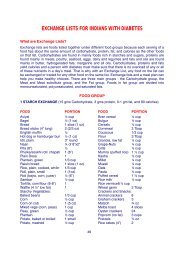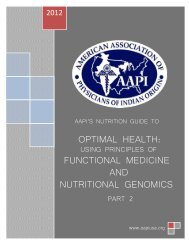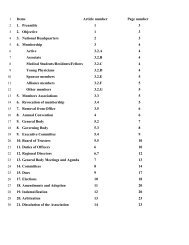functional medicine and nutritional genomics - American Association ...
functional medicine and nutritional genomics - American Association ...
functional medicine and nutritional genomics - American Association ...
Create successful ePaper yourself
Turn your PDF publications into a flip-book with our unique Google optimized e-Paper software.
AAPI’S NUTRITION GUIDE TO OPTIMAL HEALTH: USING PRINCIPLES OF FUNCTIONAL MEDICINE AND NUTRITIONAL GENOMICS<br />
hundreds of genes that control insulin function <strong>and</strong><br />
obesity. An optimal diet to prevent <strong>and</strong> treat<br />
diabesity includes healthy fats such as olive oil,<br />
nuts, avocados, <strong>and</strong> omega-3 fats, along with<br />
modest amounts of lean animal protein. This is<br />
commonly known as a Mediterranean diet. l,li<br />
Hormonal Dysregulation: Insulin, Thyroid, Adrenal<br />
<strong>and</strong> Sex Hormones<br />
Obesity results from <strong>and</strong> drives neurohormonal<br />
immune dysregulation. lii<br />
Impairment in insulin<br />
sensitivity, thyroid metabolism, adrenal function <strong>and</strong><br />
sex hormones, neuroendocrine appetite regulation<br />
are common features in diabesity.<br />
Undiagnosed thyroid disease worsens insulin<br />
resistance, liii<br />
<strong>and</strong> insulin resistance worsens thyroid<br />
function. liv<br />
Chronic stress drives chronically<br />
elevated cortisol which promotes insulin resistance,<br />
central adiposity, dyslipidemia, depression even<br />
dementia. lv Elevated cortisol also promotes muscle<br />
loss, interferes with thyroid <strong>and</strong> growth hormones,<br />
<strong>and</strong> negatively impacts sleep, all of which leads to<br />
problems with weight gain. Sleep deprivation or<br />
impaired sleep, in turn, increases appetite <strong>and</strong><br />
increases sugar <strong>and</strong> refined carbohydrate cravings.<br />
In a study of healthy young men deprived of just<br />
2 hours of sleep, their blood levels of ghrelin<br />
(the hunger hormone) increased <strong>and</strong> PYY (the<br />
brake on appetite) decreased. lvi<br />
Diabesity also drives sex hormone dysregulation.<br />
Insulin resistance underlies infertility lvii<br />
<strong>and</strong> polycystic<br />
ovarian syndrome. lviii<br />
In men, insulin resistance<br />
results in <strong>and</strong>rogen deficiency <strong>and</strong> impaired sexual<br />
function. lix<br />
Inflammation: Refined Sugars <strong>and</strong> Food<br />
Sensitivities<br />
Silent inflammation is a final common pathway in<br />
most chronic diseases, including heart disease,<br />
cancer, Alzheimer’s, <strong>and</strong> diabesity. lx<br />
Elevated Creactive<br />
protein confers a 1700% increased risk of<br />
developing diabetes. lxi Inflammation from any<br />
source (allergen, infection, toxin, diet, stress)<br />
promotes obesity <strong>and</strong> obesity drives further<br />
inflammation. Anti-inflammatory medications do not<br />
address the most important question, ‚What is<br />
47<br />
causing the inflammation, <strong>and</strong> how do we treat it<br />
most effectively?‛<br />
Sugar, refined carbohydrates, artificial sweeteners,<br />
food allergies <strong>and</strong> sensitivities, chronic infections,<br />
environmental <strong>and</strong> metabolic toxins, stress, <strong>and</strong> a<br />
sedentary lifestyle all promote inflammation. Each<br />
of these underlying causes of inflammation has to<br />
be addressed if diabesity is to be treated<br />
effectively.<br />
Dietary Sugars, Refined Flours, <strong>and</strong> Artificial<br />
Sweeteners<br />
Dietary sugars <strong>and</strong> refined flours are the single<br />
biggest triggers of inflammation driving<br />
hyperinsulinemia leading to a biochemical cascade<br />
that alters gene expression promoting inflammation,<br />
lxii<br />
<strong>and</strong> downward spiral into further inflammation<br />
<strong>and</strong> insulin resistance. Lack of fiber <strong>and</strong> too many<br />
inflammatory omega-6 fats (soybean <strong>and</strong> corn<br />
oil) <strong>and</strong> not enough anti-inflammatory omega-3<br />
fats (fish oil, flax seeds) also contribute to the<br />
development of systemic inflammation.<br />
Special Note: Artificial Sweeteners<br />
Artificial sweeteners promote obesity through<br />
increasing hunger, food consumption, <strong>and</strong><br />
reductions in body temperature <strong>and</strong> thermogenesis.<br />
In a recent study, rats were fed yogurt sweetened<br />
either with sugar or artificial sweetener for 14<br />
days. The rats that consumed the artificially<br />
sweetened yogurt increased their total food<br />
consumption, but not total calories, <strong>and</strong> yet body<br />
fat <strong>and</strong> weight increased, while body temperature<br />
<strong>and</strong> thermogenesis decreased. lxiii<br />
Food Sensitivities <strong>and</strong> Allergies<br />
Delayed or Type 3 IgG food sensitivities or<br />
allergens also may play a role in the development<br />
of insulin resistance <strong>and</strong> diabesity through<br />
promotion of systemic low-grade inflammation. In a<br />
study that compared obese children to-normal<br />
weight children, the obese children had three-fold<br />
higher levels of C-reactive protein <strong>and</strong> a two<strong>and</strong>-a-half-fold<br />
higher level of IgG antibodies for<br />
the 277 different foods tested. lxiv<br />
In addition, these<br />
2012

















